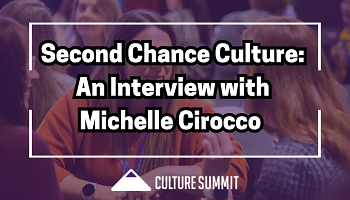
Second Chance Culture: An Interview with Michelle Cirocco
We were thrilled to have the opportunity to interview Michelle Cirocco, Chief Impact Officer at Televerde and Keynote Speaker at Culture Summit 2023. She shared the importance of fostering a culture of second chances and her own transformative journey.
Her unique perspective not only encourages businesses to rethink their hiring practices but also reinforces society’s need to change its perception of individuals with criminal backgrounds.
Her words serve as an inspiration for others to become advocates for change within their organizations, promoting the transformative power of second chances.
Learn more in our interview below.
What initially sparked your interest in fostering a culture of second chances within the workplace?
My personal journey sparked my interest in fostering a culture of second chances within the workplace. I served a 7-year sentence at the Arizona women’s prison when I got my first exposure to Corporate America through Televerde. This opportunity for a second chance was not just a lifeline but a complete transformation. It saved my life and opened my eyes to the untapped potential within the incarcerated community. However, the stigma associated with this community was a barrier that kept many of us in the shadows. I saw talented, capable, and qualified women who had built significant knowledge and experience while working for Televerde during their incarceration being sidelined in the hiring process after their release. They were cast aside because of a past mistake, and their applications were discarded when they checked the box indicating a felony conviction. This was a heartbreaking reality that I was desperate to change. I wanted to challenge this narrative and bring to light the capabilities and potential of these individuals who, like me, were seeking a chance to prove themselves. I wanted to show that a person’s past does not define their future and that the stigma of incarceration should not be a life sentence in itself.
Despite the awareness of the benefits, why do you think companies still exclude qualified talent from their hiring practices?
Despite the clear benefits, many companies still exclude qualified talent from their hiring practices due to a combination of risk management and unconscious bias. The stereotypes associated with individuals with criminal backgrounds often overshadow their potential. These conscious or unconscious biases paint a picture of dishonesty, unreliability, and potential harm to the company’s reputation. This is a narrative we need to challenge and change. The reality is that people with criminal backgrounds are just as capable, hardworking, loyal, trustworthy, and dedicated as anyone else. They deserve the opportunity to prove themselves and contribute to society. By excluding them, we are not only denying them a chance at redemption, but we are also limiting the diversity and potential within our companies.
From your experience, what are the business benefits of investing in “second chance” employees? How does it positively impact companies?
Investing in second-chance employees brings significant business benefits. According to the Society for Human Resource Management (SHRM) Getting Talent Back to Work initiative and research released by SHRM, the SHRM Foundation, and the Charles Koch Institute, hiring individuals with criminal backgrounds can increase loyalty, lower turnover rates, and create a larger talent pool. These individuals often display high commitment and dedication, grateful for the opportunity to prove themselves. Furthermore, consumers increasingly demand total inclusion, making it not only a moral imperative to invest in this community but a business one. These individuals are not just employees but a testament to the power of redemption and the potential for transformation. They bring unique skills and resilience that can contribute to a company’s innovation and adaptability.
Why must HR and culture professionals actively work towards building a culture that allows second-chance employees to thrive?
It is crucial for HR and culture professionals to actively work towards building a culture that allows second-chance employees to thrive. This is not just about doing the right thing morally; it’s about smart business. True inclusion means not excluding anyone, including individuals with criminal backgrounds. By fostering a culture of second chances, we are not only giving these individuals an opportunity to rebuild their lives but also enriching our companies with a workforce that embodies resilience, determination, and diverse life experiences. We are challenging the status quo and pushing the boundaries of true inclusion. It’s about recognizing the potential in every individual and creating an environment where they can thrive and contribute to the company’s success.
Could you highlight what makes your session at Culture Summit 2023, “How a Culture of Second Chances,” a not-to-be-missed session for Culture champions?
Our session at Culture Summit 2023 How a Culture of Second Chances Will Help Businesses Thrive in the Future of Work is a must-attend for culture champions because it challenges the status quo and pushes the boundaries of true inclusion. It’s an enlightening exploration of the untapped potential within the incarcerated community and a call to action for companies to embrace a culture of second chances. This session will not only change the way you view hiring practices, but it will also inspire you to become an advocate for change within your organization. You will leave with a renewed perspective on the power of redemption and the potential for transformation. It’s not just about giving someone a second chance; it’s about changing lives and enriching our companies.
company culture, culture, driving big changes, expert insights